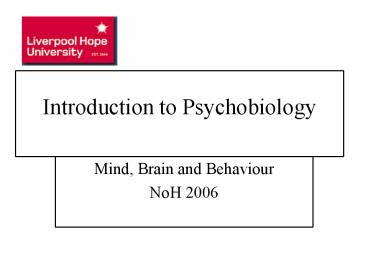Introduction to Psychobiology - PowerPoint PPT Presentation
1 / 20
Title:
Introduction to Psychobiology
Description:
Assumes that even quite complex human behaviour and thought can be explained ... mechanisms are designed to solve adaptive problems (e.g. detecting cheats) ... – PowerPoint PPT presentation
Number of Views:190
Avg rating:3.0/5.0
Title: Introduction to Psychobiology
1
Introduction to Psychobiology
- Mind, Brain and Behaviour
- NoH 2006
2
Assumptions of Biopsychology
- Assumes that even quite complex human behaviour
and thought can be explained according to
physiological mechanisms, e.g. hormones,
neurotransmitters - Genes (and gene-environment interactions) often
assumed as ultimate causes of behaviour that help
structure physiology and hence behaviour - Research focuses on detecting ever-finer levels
of physiological functioning in order to discover
the causes of behaviour
3
Evolutionary Psychology
EVOLUTIONARY PSYCHOLOGY Evolutionary basis of
behaviour and culture Humans are animals and have
been subjected to the same processes of
evolutionary change as all other living things on
earth (e.g. John Tooby, Leda Cosmides, David
Buss, Martin Daly, Margo Wilson, Donald Symons,
Laura Betzig, Steven Pinker
SOCIOBIOLOGY Evolutionary explanations of social
behaviour (e.g. Wilson, 1975)
Criticises the SSSM (Standard Social Science
Model) as being cut off from the natural
sciences We are products of biology and culture,
nature and nurture
4
Which statement is correct?
- Evolution is progress from lower to higher life
forms
b. Evolution is not about progress, but about
random change
5
http//www.pbs.org/wgbh/nova/link/evolution.html
6
Natural Selection
Organisms struggle for limited resources
Individuals vary in their physical behavioural
characteristics
NS shapes the characteristics of organisms and
those that survive are better adapted to the
environment
Some characteristics give organisms an advantage
over other organisms and thus enable them to
leave more offspring
7
Key words to evolution
- V Variation
- I Inheritance
- S Selection
- A Adaptation
8
Variation
- All individuals within a species show variation
in their behaviour, morphology or physiology - This variation is called the PHENOTYPE
- The basis for this variation lies in the genes of
the individual. The genetic variation is called
the GENOTYPE - Genotype Environment Phenotype
9
Genotype (Facultative genes)
Environment (diet, nutrition, toxins etc)
Phenotype (tall, medium, small etc)
10
Sickle Cell anemia
- http//www.pbs.org/wgbh/evolution/library/01/2/l_0
12_02.html - 5 mins..
- Examples of other cases of recent evolution-
Lactose intolerance
11
Selection and Adaptations
- Traits that are favourable help organisms to
survive and reproduce - Thus, favourable traits are passed on to the next
generation. - The favourable traits are called ADAPTATIONS
- Psychological adaptations difficult to study- no
direct fossil evidence! - Adaptation, by-product or random genetic
variation?
12
Example Bipedal locomotion in humans
- Variation early hominids showed variation in
their posture - Inheritance This variation was under genetic
control, and was passed from parents to offspring - Selection Individuals with more upright posture
survived longer and produced more offspring - Adaptation Thus, upright posture made us better
adapted to our environment (physical and social)
13
Tinbergens 4 WhysExample Human Language
- Mechanistic (or proximate cause)
- Developmental (or ontogenetic)
- Historical (or phylogenetic)
- Functional (or ultimate)
Have a go at working out the 4 whys for bird song!
14
Study of human behaviour
- Human behavioural ecology (HBE) focuses on
behavioural traits that promote differences in
fitness between individuals (i.e. leave more
offspring) - Evolutionary psychology focuses on what has
shaped the human psyche over evolutionary time
and whether our psychological mechanisms are
designed to solve adaptive problems (e.g.
detecting cheats)
15
Evolutionary Psychology
- 1. Problems humans encountered in the ancestral
environment - a) Finding a vigorous healthy mate
- b) Forming reciprocal co-operative relationships
- c) Avoiding brother-sister mating
- 2. Psychological tools that evolved to help solve
those problems - d) Vigourous dance/sports indicating health
strength - e) Detecting cheaters in these relationships
- f) Adult sexual aversion to childhood intimates
- 3. The way those tools function now
- g) Vigorous movements in dance sport
- h) Gossip that helps us learn about cheaters
- i) Shim pau marriages, kibbutzim sexual
attraction, attraction between brothers sisters
reared apart
16
Environment of Evolutionary Adaptiveness (EEA)
Modern history and culture, including
agriculture, only dates back to the last few
thousand years.
Yet the earliest human species dates back 2.5
million yrs. Thus the time since the beginnings
of agriculture (10,000 yrs ago) is less than 1
of the 2 million yrs our ancestors spent as
hunter-gatherers in the Pleistocene. The EEA
therefore shapes our modern psychology and
behaviour.
- Stone age minds in modern world??? Perhaps some
of our behaviour is not adapted to modern day
living.
17
Criticisms of evolutionary psychology
- All behaviours are not adaptive
- Researchers disagree as to the nature of EEA
- Finding adaptive explanations for behaviour
leads to Just-so stories - Researchers infer causes from results
- Gradual view of evolutionary change has been
criticised - The role of culture is given little importance
18
Summary key concepts
- EP approach assumes people show physical and
mental adaptations to ancestral environments
(EEAs). These adaptations, shaped by NS, can be
assumed to be universal. - Evolved psychological mechanisms, shaped during
EEA, can explain complex human behaviour (from
altruism to religion). These mechanisms/modules
originally helped our ancestors to solve specific
adaptive problems. - Critics of EP challenge its assumptions about
adaptation, the EEA and the universality of human
nature.
19
http//www.pbs.org/wgbh/evolution/library/01/6/l_0
16_08.html
- Meredith Small and Geoffrey Miller on MHC complex
- 3 mins
20
Little people
- http//www.pbs.org/wgbh/nova/sciencenow/3209/01.ht
ml































